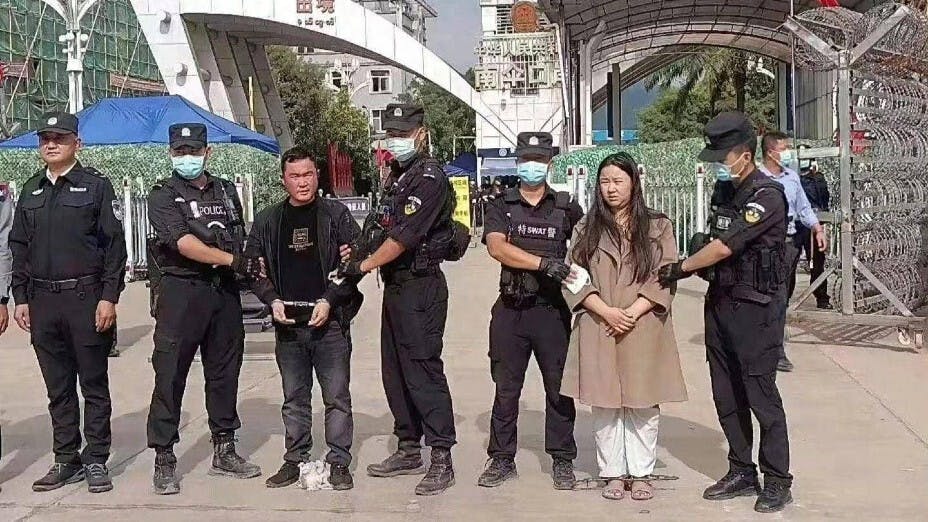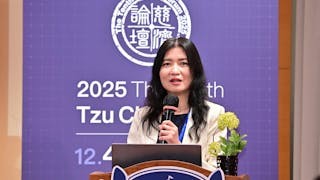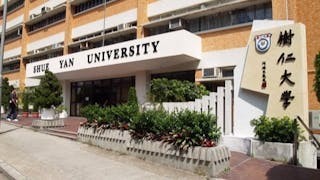2023年11月21日,緬北當局將涉嫌電信網絡詐騙的犯罪嫌疑人移交中方,並被公安機關陸續押回。這一事件標誌着從緬甸引渡到中國的疑犯數量,可能是打擊跨國犯罪史上最多的一次。
在移交的 31000 名疑犯中,據稱有組織頭目骨幹63名、網上在逃人員1531名。近期緬北爆發民族衝突和戰爭後,共有2萬至3萬華人返回中國。
跨境電詐的華人家族
2023年11月初,中國政府正式宣布對4名涉嫌電信詐騙主謀的頭目發出逮捕令,包括明學昌、明國平、明菊蘭和明珍珍。由於擔心受到中國當局的懲罰,明學昌在11月16日自殺。據中國網站報道,逮捕令發出後,明家人包括明學昌的兒子明國平(又稱明小平,出生於緬甸,撣邦和果敢經濟特區的民兵中隊長)、女兒明菊蘭(1981年出生於雲南)和孫女明珍珍(1996年出生於雲南)經過激烈討論。據中國大陸消息稱,明學昌向緬甸一名軍方將領打電話求助,表示自己已經向後者支付了巨額款項。不過,這名將軍回答說,由於從事電信詐騙5個家族之一的明學昌家族,欺騙許多中國人為緬北的網絡犯罪集團工作,10月20日殺害了一批60名中國公民,他們試圖逃離明學昌控制的「臥虎山莊」園區電信詐騙基地。被殺的中國公民中,有4名來自中國的臥底警察。為此,中方向緬甸政府施壓,要求其有效打擊電詐集團。根據中國新聞報道,明學昌尋求軍方將領援助,軍方將領批評他及其同夥造成天大麻煩。明學昌和家人被安排上飛機,但在上飛機之前,他「畏罪自殺」了,相信目的是確保家人能安全去到中國。11月16日,明國平、明菊蘭、明珍珍被緬甸當局逮捕,並被移交給中國警方。
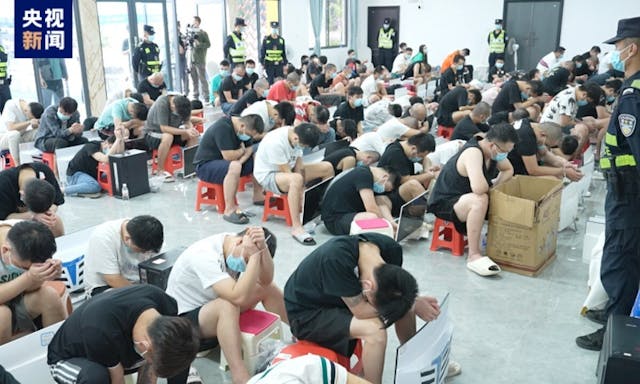
必須指出的是,明家只是活躍在緬北的第5個家族。另外4個涉及華人的家族包括白所成家族(白所成1950年出生於果敢,領導果敢聯邦團結與發展黨)、魏超仁家族(魏超仁出生於江西,曾任緬甸民族民主同盟軍參謀長,但後來退出。他女兒魏榕的亨利集團涉足房地產、酒店、珠寶甚至電信詐騙業務)、劉國璽家族(劉國璽出生於雲南,2020年去世,但其家族成員從事採礦、賭博和酒店生意),以及劉正祥家族(劉正祥的福利來集團活躍在撣邦,他成為「成功」商人)。
這些家族都有華人和果敢血統,但白家、魏家和劉國璽家族卻反抗他們的領導人彭家聲,後者是缅甸撣邦第一特區政府前主席和緬甸民族民主同盟軍(下稱果敢同盟軍)創建者。彭家聲1931年出生於果敢,於2022年去世,他從另一位果敢華裔土司楊振才那裏學習軍事和戰術。1969年至1989年,彭家聲在果敢成為緬甸共產黨領導人,並於1989年成立了果敢同盟軍。彭家聲及其下屬因在20世紀70年代和80年代參與販運海洛英而受到批評。2009年8月,彭家聲陷入政治低谷,下屬白所成、魏超仁、劉國璽、劉正祥等不僅挑戰他的權力,而且開始站在軍政府這邊。彭家聲曾被視為毒梟,但他在1990年代和2000年代的頹勢,最近被他的兒子彭德仁和部下扭轉了。彭德仁領導的果敢同盟軍在森林裏「撿到」一些武器,一直打到老街,對原本反抗彭家聲的4個家族中的3個家族構成了嚴重威脅,除了劉正祥家族沒有真的和彭家聲反目成仇。
2023年10月27日,果敢同盟軍開始攻擊電信詐騙集團,其中包括白家,白所成的兒子白應蒼及家人乘直升機逃跑時,被果敢同盟軍擊中發生爆炸而喪生。
果敢家族之間鬥爭對中緬關係的影響
果敢家族之間的權力鬥爭,對整個緬甸的政治,特別是中緬關係產生了重要影響。
首先,果敢各大家族的政治鬥爭是激烈和暴力的。大家族之間的權力鬥爭,形成了果敢和撣邦地區家族競爭的態勢。
其次,果敢同盟軍有近8000名民兵,最重要的是,他們「突然」發現了武器,包括120枚火箭和一些烏克蘭武器,這似乎是一個令人驚訝的事件。不過,根據澳門中文報紙報道,果敢同盟軍邀請一些退休武器製造商和技術人員訪問果敢,進一步改進其武器裝備。此外,果敢同盟軍擁有的無人機,不僅有助對付敵對家族,還有助對抗緬甸政府軍。
第三,中方成功遊說緬甸軍政府遏制電信詐騙集團和家族的影響力,近年來這些電信詐騙集團和家族,不斷欺騙許多不明真相的中國人到緬北電詐集團工作。有些中國人很容易受騙上當,相信他們可以透過在緬甸工作輕鬆賺錢。儘管中國大陸透過傳媒對普通公民進行教育,但仍有一些人很容易成為電詐集團的受害者。搗毀涉及電信詐騙的家族和集團,可以有望改善跨境犯罪的狀況。事實上,10月31日,中國公安部長王小洪會見了緬甸軍政府和緬甸國家管理委員會主席敏昂萊將軍,表達了中方願與緬甸軍政府共同遏制跨境犯罪活動的願望,並提出4點要求:一、嚴厲打擊跨國犯罪;二、共同維護邊境地區的和平與穩定;三、希望緬甸盡快處理好內務,創造一個和平穩定的發展環境; 四、希望緬甸政府軍實際保障中國在緬甸人員的人身安全及財產安全。此前,中國外交部部長助理農融11月3日亦訪問了緬甸。
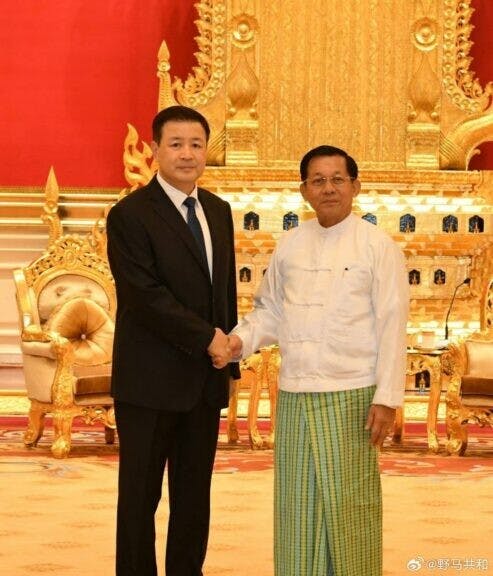
中國官員兩次訪問緬甸,代表了用警力巡查和透過外交管道,遏制與消弭緬北電詐集團的雙管齊下策略。
另一個有趣的解讀是,中國官員出訪緬甸不僅是為了遏制電詐集團,更是緬甸當局對果敢同盟軍的巧妙處理,這一次,果敢同盟軍充當了支援肅清電詐集團的輔助力量。
第四,儘管緬甸是軍政府統治,但其勢力範圍受到限制。在緬北地區,少數民族和叛亂分子自治和活躍程度相當高。除了北部地區的叛亂組織外,緬甸西部還出現了由基督教克欽族組成的克欽民族陣線,該組織於2015年與政府簽署停火協議。在緬甸西部的若開邦,若開軍是另一個針對軍政府的叛亂組織,10月下旬導致宵禁。因此,鑑於緬甸各地叛亂勢力的持續存在,軍政權看似表面強大,但骨子裏卻很脆弱。以上情況或許可以解釋緬甸警方為何能如此迅速地打擊電詐集團並將31000名疑犯移交中方。
綜上所述,當局最近對緬北電信詐騙的行動,不僅顯示了果敢的政治(涉及多個華人家族的權鬥)與軍政府之間的權力鬥爭,而且還表明了中國政府和緬甸當局對付跨境犯罪的決心。果敢地區的民族政治包括大家族之間的權力鬥爭,他們與合法和非法企業的糾纏,以及他們與地方層面的一些腐敗官員及中央層面一些具影響力保護者的複雜關係。然而,由於4名中國大陸便衣警察不幸遇害,這些家族的「保護傘」很快便失效了。中國打擊跨境電信詐騙,採取了警察巡查和外交施壓「雙管齊下」的策略。然而,果敢的政治將如何演變,以及果敢同盟軍是否會既扮演控制對中國不利的電信詐騙集團的微妙角色,又扮演從緬甸軍政府那裏獲得一定程度自治權的動態力量,還有待進一步觀察。
Cross-border telecom fraud and ethnic Kokang politics in Northern Myanmar
On November 21, 2023, the government authorities in Northern Myanmar returned 31,000 ethnic Chinese, who were suspected of being involved in orchestrating and participating in cross-border telecommunication fraud, to the officers of criminal investigation bureau under the Ministry of Public Security of the People’s Republic of China (PRC) – an event that marked the largest number of alleged suspects being extradited from Myanmar to China perhaps in the history of the combat against cross-border crime.
Among the 31,000 returned suspects, there were allegedly sixty-three syndicate organizers and 1,531 persons who were under the arrest warrants. After the recent outbreak of ethnic conflicts and war in Northern Myanmar, a total of 20,000 to 30,000 ethnic Chinese returned to the PRC.
In early November 2023, the PRC government officially announced that arrest warrants were issued to four allegedly masterminds of the telecom fraud, including Myin Shaw Chang (Ming Xuechang in Chinese), Ming Guoping, Ming Julan and Ming Zhenzhen. Ming Xuechang committed suicide on November 16th for fear of being punished by the Chinese authorities. It was reported in a mainland website that after the arrest warrants were issued, the Ming family, including Mye’s son Ming Guoping (a man also named Ming Xiaoping born in Myanmar and a village militia captain in Shan state and Kokang special economic zone), daughter Ming Julan (born in Yunan in 1981), and granddaughter Ming Zhenzhen (born in Yunan in 1996), had an intense discussion. According to the mainland Chinese news, Ming Xuechang called a military general in Myanmar for help, saying that he had already paid the latter a huge sum of money. However, the general replied that due to the fact that on October 20th, the Ming clique, which was one of the five cliques that engaged in telecom fraud cheating many mainland Chinese to work for cybercrime groups in Northern Myanmar, killed a group of 60 Chinese nationals who attempted to escape from a telecom scam base in Crouching Tiger Compound under the control of Ming Xuechang. Among the killed Chinese nationals, there were four undercover police agents from the PRC. As such, the PRC side exerted pressure on the Myanmar government to deal with the telecom fraud syndicates effectively. The military general whom Ming Xuechang contacted for assistance, according to the mainland news reports, criticized Ming and his associates for creating a huge trouble. Ming and his family members were arranged to get on a plane, but before Ming went on board, he was “told” to “commit suicide” so that his family members would be safe and handed back to the PRC side. On November 16th, Ming Guoping, Ming Julan and Ming Zhenzhen were arrested by the Myanmar authorities and they were extradited back to the mainland police side.
It must be noted that the Ming syndicate was only the fifth clique active in Northern Myanmar. The other four cliques that involved the ethnic Chinese included the Bai Xuoqian family (Bai Xuoqian was also named Bai Suocheng and he was born in Kokang in 1950 and he led the Union Solidarity and Development Party in Kokang), the Wei Chaoren family (Wei was born in Jiangxi and became once chief-of-staff of the Myanmar National Democratic Alliance Army or MNDAA, but later he withdrew and his daughter Wei Rong’s Hanley Group was involved in property, hotel, jewelry and even telecom scam businesses), the Liu Guoxi family (Liu was born in Yunan and died in 2020, but his family members were involved in the mining, gambling and hotel business), and the Liu Chengxiang family (Liu’s Fully Light Group was active in the Shan state and Liu became a “successful” businessman).
All these families had their ethnic Chinese and Kokang origins, but the Bai, Wei and Liu Guoxi groups rebelled against their leader Pheung Kya-shin (Peng Jiasheng), who was the chairperson of the Kokang special region in Myanmar and the leader of the Myanmar National Democratic Alliance Army. Born in 1931 in Kokang and died in 2022, Pheung learnt military affairs and tactics from another ethnic Chinese chief of Kokang, Edward Yang Kyein Tsai. Pheung emerged in Kokang province as a leader of the Communist Party of Burma from 1969 to 1989, when he established his MNDAA. Pheung and his subordinates were criticized for being involved in trafficking in heroin in the 1970s and 1980s. In August 2009, Pheung suffered from his political decline as his subordinates like Bai Xuocheng, Wei Chaoren, Liu Guoxi, and Liu Chengxiang not only challenged his power but also began to side with the military junta. Pheung was regarded as a drug lord, but his decline in the 1990s and 2000s has recently been reversed by his son Peng Deren and deputy Yan Winzhong. The MNDAA under Peng Deren has picked up some weapons in a forest, fighting all its way into Laukaing and constituting a serious threat to the three of the four families that originally rebelled against Pheung Kya-shin, except for the Liu Chengxiang family which had not really turned against the old Pheung.
On October 27, 2023, the MNDAA began to fight against the telecom fraud organizations, including the Bai family group, whose leader Bai Xuoqian and his family members died during the collapse of their helicopter, which was shot down by the MNDAA.
The entire power struggle within the ethnic Kokang groups had important implications for Myanmar politics in general and Sino-Myanmar relations in particular.
First, ethnic Kokang politics were fierce and violent. The power struggles among the big families shaped the development of intra-ethnic rivalries in the Kokang and Shan regions.
Second, the MNDAA in Kokang has almost 8,000 militias and, most importantly, their “sudden” discovery of weapons, including 120 rockets and some Ukrainian weapons, appeared to be a surprising event. But it was reported in a Macau Chinese newspaper that the MNDAA invited some retired weapons manufacturers and technicians to visit Kokang so that its weaponry could be improved further. Furthermore, the MNDAA had drones that helped its struggles against not only the rival family groups but also the Myanmar military.
Third, China has succeeded in lobbying the Myanmar government to curb the influence of the syndicates and families that were involved in telecommunication fraud, which in recent years have been cheating many ignorant Chinese citizens to work in Northern Myanmar’s telecom scam organizations. Some mainland Chinese were easily deceived and made to believe that they could make easy profits by working in Myanmar. While education of ordinary citizens in mainland China has been made through media publicity, still some of them have been the easy victims of telecom fraud syndicates. The dismantling of the families and syndicates involved in telecom fraud can and will hopefully improve the situation of cross-border crime. In fact, on October 31, the Minister of the PRC Public Security, Wang Xiaohong, paid a visit to the Myanmar military high command and general Min Aung Hlaing, expressing the Chinese desire to work with the Myanmar military regime to curb cross-border criminal activities. Wang’s visit was followed by another visit by the PRC Foreign Ministry’s assistant minister Nong Rong on November 3, making four requests: (1) the persistence in the combat against cross-border crime; (2) the joint efforts at improving the governance of the border regions; (3) the support of Myanmar to deal with disputes within the constitutional and legal framework; and (4) the need for Myanmar to assist China in the process of maintaining border stability.
The two visits by Chinese officials represented a two-pronged strategy – one by the police and the other through diplomatic channel – of controlling and eliminating the telecommunication fraud syndicates in Northern Myanmar.
Another interesting interpretation was that the mainland official visits aimed at achieving not just the pacification of the telecom fraud syndicates but also the Myanmar authorities’ skillful handling of the MNDAA, which this time acted like an auxiliary force in support of the purge of the telecom fraud organizations.
Fourth, even though Myanmar is governed by the military junta, its territorial outreach encounters limitations in Norther Myanmar where ethnic groups and rebels are quite autonomous and active. Apart from the rebel groups in the northern regions, Western Myanmar also witnesses the Chin National Front, which is composed of the Christian Chin minority, and which signed a ceasefire with the government in 2015. In the Rakhine state in Western Myanmar, the Arakan Army is another rebel group against the military junta in late October, leading to a curfew. Therefore, in view of the persistence of rebels in different parts of Myanmar, the military regime appears to be strong on the surface but fragile underneath – a situation that might explain the rapidity in which the Myanmar police moved quickly against the telecom fraud syndicates and returned 31,000 ethnic Chinese back to the PRC.
In conclusion, the recent control over telecom fraud in Northern Myanmar has demonstrated not only the interplay between ethnic Kokang politics, where power struggles have involved several ethnic Chinese family groups, and the military regime, but also the determination of the PRC government and the Myanmar authorities to deal with cross-border crime. Ethnic politics in the Kokang region have embraced the power struggles among big family groups, their entanglement with both legitimate and illegitimate businesses, and their complex relations with some corrupt officials at the local level and perhaps some influential protectors at the central level too. Their protective “umbrella,” however, quickly collapsed after the death of four mainland Chinese undercover police. China’s combat against cross-border telecom fraud was ascertained after the two-pronged strategy of utilizing the police visit and diplomatic pressure was adopted. However, it remains to be seen how ethnic Kokang politics will evolve and whether the MNDAA will perhaps play both a delicate actor of controlling telecom fraud groups detrimental to China and a dynamic force acquiring some limited degree of autonomy from the central military authorities in Myanmar.
原刊於澳門新聞通訊社(MNA)網站,本社獲作者授權轉載。網址:https://www.macaubusiness.com/opinion-cross-border-telecom-fraud-and-ethnic-kokang-politics-in-northern-myanmar/



